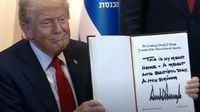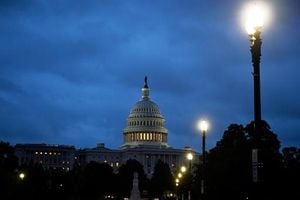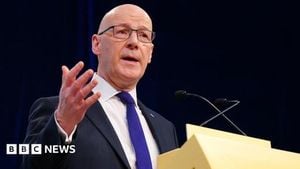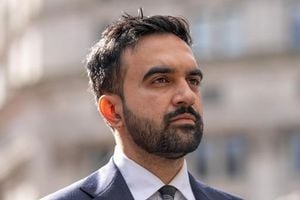On October 13, 2025, a rare sense of hope and celebration swept across Israel, Gaza, and much of the Middle East as the last 20 surviving Israeli hostages were released by Hamas under a U.S.-brokered ceasefire deal. This pivotal moment marked what many are calling the most significant step toward peace in the region in years—a step underscored by U.S. President Donald Trump’s historic address to Israel’s parliament, the Knesset, and a high-stakes summit in Egypt attended by over 20 world leaders.
The emotional release of the hostages, confirmed by the Israeli military after their transfer from Gaza by the Red Cross, set off scenes of jubilation at Tel Aviv’s Hostage Square. Thousands gathered, cheering, hugging, and weeping openly. According to Reuters, the mood was electric, as families and supporters celebrated the safe return of loved ones after two years of war and uncertainty.
President Trump, who played a central role in brokering the ceasefire, arrived in Israel to a hero’s welcome. Flanked by Israeli Prime Minister Benjamin Netanyahu, his wife Sara, and Knesset Speaker Amir Ohana, Trump signed the Knesset guestbook, declaring, “This is my great honor — a great and beautiful day, a new beginning.” His visit marked only the fourth time a sitting U.S. president has addressed the Knesset, following in the footsteps of Jimmy Carter in 1979, Bill Clinton in 1994, and George W. Bush in 2008, as detailed by The Economic Times and India Today.
In his address before the Knesset, Trump proclaimed, “The skies are calm, the guns are silent, the sirens are still and the sun rises on a Holy Land that is finally at peace.” He later told reporters at Ben Gurion International Airport, “Everybody is happy, whether it’s Jewish, Muslim, or the Arab countries. Every country is dancing in the streets.” He reiterated, “The war is over, you understand that?”—a statement that captured the moment’s gravity and optimism, as reported by India Today.
The ceasefire and hostage exchange were the first phase of a Gaza accord hammered out the previous week at the Egyptian resort of Sharm el-Sheikh. The agreement included not only the release of Israeli hostages but also the freeing of nearly 2,000 Palestinian detainees and prisoners, according to Reuters. The 20 Israeli hostages were released in two phases—first seven, then the remaining 13 together—with all handed over to the Red Cross. The remains of some of the 28 dead hostages were also to be released, though the fate of two captives remained unknown.
As the deal unfolded, the United Nations reported a ramping up of humanitarian aid to Gaza, including the entry of cooking gas for the first time since March and expanded food and medical deliveries. The devastation in Gaza, however, remained staggering. According to Gaza health officials, more than 67,000 Palestinians have been killed since the conflict erupted on October 7, 2023, when a Hamas cross-border attack killed 1,200 people in Israel and took 251 hostage—the deadliest day for Jews since the Holocaust.
Palestinian returnees to northern Gaza described scenes of utter ruin. Rami Mohammad-Ali, a 37-year-old who walked 15 kilometers with his son from Deir al Balah to Gaza City, told Reuters, “We couldn't believe the devastation. We are joyful to return, but bitter about the destruction,” recalling the sight of human remains scattered along the roads.
While Trump’s role in brokering the ceasefire was widely celebrated in Israel—crowds at Hostage Square cheered for him and even booed Netanyahu during a speech by Trump’s envoy Steve Witkoff, according to Reuters—the political landscape remains fraught. Critics of Netanyahu, including hostages’ families, accuse him of prolonging the conflict to maintain the support of his far-right coalition partners, a charge that has dogged his tenure. The International Criminal Court, meanwhile, has issued arrest warrants for Netanyahu for alleged war crimes and crimes against humanity, accusations Israel strongly denies.
The prisoner exchange, too, was not without controversy. The Israeli Justice Ministry released the names of 250 Palestinians convicted of serious crimes to be freed, but the list excluded senior Hamas commanders and other high-profile figures demanded by Hamas. Talks over the final list were ongoing, and about 1,700 Gazans detained since October 7, 2023, were also to be released. The Hamas-run Interior Ministry stated it would deploy security forces in areas vacated by the Israeli army, but whether armed militants would return in significant numbers—potentially provoking Israel—remained unclear.
Trump’s 20-point blueprint for peace, the centerpiece of his diplomatic push, envisions the formation of an international “Board of Peace” led by himself. While Trump had previously suggested Tony Blair could play a role, he later questioned Blair’s suitability due to criticism over his role in the Iraq War. The next steps in the plan—including who will govern Gaza post-war and the ultimate fate of Hamas, which has rejected Israel’s demands to disarm—are still up for negotiation. As Palestinian analyst Akram Attallah told Reuters, “If they choose to backtrack, they can find excuses and blame Hamas. Meanwhile, Hamas, the weaker party, loses all leverage once it hands over the hostages.”
Later on October 13, 2025, Trump and more than 20 world leaders gathered in Sharm el-Sheikh, Egypt, for a summit aimed at finalizing the peace framework and discussing post-war reconstruction. Palestinian President Mahmoud Abbas was scheduled to attend, though no Israeli officials would be present, according to an Axios report cited by Reuters.
Despite the celebratory tone, many recognize that the path to a lasting peace remains uncertain. Defense Minister Israel Katz warned that after the return of the hostages, the Israeli military would proceed to destroy Hamas’ underground tunnel network in Gaza. The ceasefire, while a momentous achievement, is fragile, and the trauma and devastation of the past two years linger for both Israelis and Palestinians.
Amid the complexity, the day’s events were historic. Trump’s address to the Knesset was met with a nearly unanimous standing ovation, and Knesset Speaker Amir Ohana announced that Israel would nominate Trump for the 2026 Nobel Peace Prize. As Trump said before departing for the summit in Egypt, “The skies are calm, the guns are silent, the sirens are still and the sun rises on a Holy Land that is finally at peace.”
For now, the world watches and waits to see if this fragile peace can hold—and whether the promise of a new beginning for the Middle East can truly be realized.





